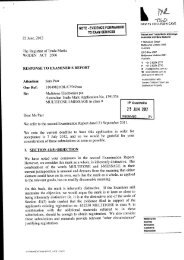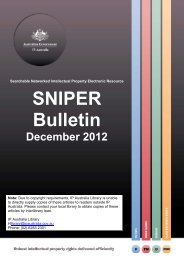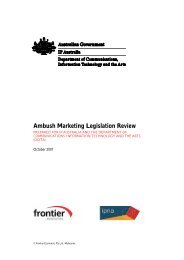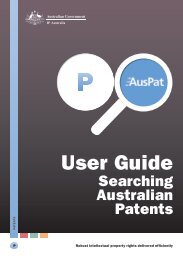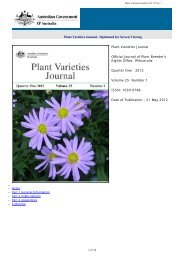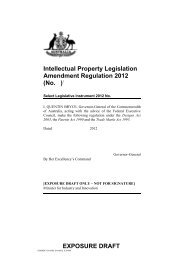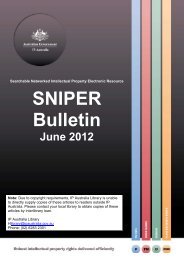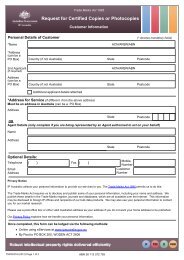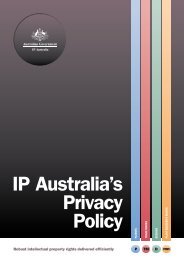47. Volume 14- Number 2 - IP Australia
47. Volume 14- Number 2 - IP Australia
47. Volume 14- Number 2 - IP Australia
You also want an ePaper? Increase the reach of your titles
YUMPU automatically turns print PDFs into web optimized ePapers that Google loves.
Overseas Testing/Data<br />
The PBR Act allows DUS data produced in other countries<br />
(overseas data) be used in lieu of conducting a comparative<br />
trial in <strong>Australia</strong> provided certain conditions relating to the<br />
filing of applications, sufficiency of the data and the<br />
likelihood that the candidate variety will express the<br />
distinctive characteristic(s) in the same way when grown<br />
locally. Briefly the overseas data could be considered<br />
where:<br />
• The first PBR application relating to the candidate<br />
variety has been lodged overseas, and<br />
• the variety has previously been test grown in a UPOV<br />
member country using official UPOV test guidelines<br />
and test procedures, (ie. equivalent to a comparative trial<br />
in <strong>Australia</strong>) and<br />
• either, all the most similar varieties of common<br />
knowledge (including those in <strong>Australia</strong>) have been<br />
included in the overseas DUS trial, or<br />
• the new overseas variety is so clearly distinct from all<br />
the <strong>Australia</strong>n varieties of common knowledge that<br />
further DUS test growing is not warranted, and<br />
• sufficient data and descriptive information is available<br />
to publish a description of the variety in an accepted<br />
format in Plant Varieties Journal; and to satisfy the<br />
requirements of the PBR Act.<br />
TAXA THAT MUST BE TRIALLED IN<br />
AUSTRALIA<br />
It is the policy of this office to not accept overseas data<br />
for the following taxa due to the wide genotype by<br />
environment interactions that have been previously<br />
experienced. Varietal descriptions from overseas trials<br />
have consistently been different from those obtained<br />
from trials grown under <strong>Australia</strong>n conditions.<br />
Consequently, for the following taxon a full PBR trial<br />
must be conducted in <strong>Australia</strong>:<br />
Solanum tuberosum Potato<br />
The Qualified Person, in consultation with the<br />
agent/applicant, and perhaps other specialists and<br />
taxonomists, will need to evaluate the overseas data, test<br />
report and photographs to see if the application does fulfil<br />
all PBR Office requirements, and then advise the<br />
agent/applicant:<br />
• either, to submit Part 2 incorporating a description for<br />
publication, any additional data and photographs and to<br />
pay the examination fee;<br />
• or, to conduct a DUS trial in <strong>Australia</strong>, recommending to<br />
the applicant/agent which additional varieties of<br />
common knowledge to include;<br />
• or, submit Part 2 including additional data (information<br />
about similar varieties in <strong>Australia</strong> to show that they are<br />
clearly distinct from the candidate variety that a further<br />
DUS test growing including the similar varieties is not<br />
warranted and that the variety displays the distinctive<br />
characteristics when grown in <strong>Australia</strong>)<br />
Please note that the PBR office does not obtain overseas<br />
DUS test reports on behalf of applicants. It is the sole<br />
responsibility of the applicants to obtain these reports<br />
directly from the relevant overseas testing authorities.<br />
Where applicants already have the report they are advised to<br />
submit a certified true copy of the report with the Part 1<br />
application. Applicants, or those duly authorised, may<br />
certify the copy.<br />
If you do not have the test report available at the time of<br />
Part-1 application then you are advised to submit the Part-1<br />
application without the test report. However, you should<br />
make arrangements to procure the DUS test report directly<br />
from the relevant testing authority. When the report<br />
becomes available, a certified copy should be supplied to<br />
the QP and the PBR office.<br />
When the trial is based on an UPOV technical guideline and<br />
test report in an official UPOV language (English, German<br />
or French), it can be lodged in support of the application. In<br />
other cases the test reports must be in English.<br />
The applicant/agent and Qualified Person should use the<br />
overseas test report to complete Part 2 of the application,<br />
making a decision on how to proceed in view of the<br />
completeness of the information, the comparators (if any)<br />
used in the overseas DUS trial and their knowledge of<br />
similar <strong>Australia</strong>n varieties that may not have been included<br />
in the overseas test report.<br />
If a description is based on an overseas test report,<br />
<strong>Australia</strong>n PBR will not be granted until after the decision<br />
to grant PBR in the country producing the DUS test is<br />
made. The final decision on the acceptability of overseas<br />
data rest with the PBR office.<br />
Descriptions from the Voluntary<br />
Cereal Registration Scheme<br />
Following the closure of the Voluntary Cereal Registration<br />
Scheme, we have been advised that no more descriptions of<br />
cereal varieties registered under this voluntary scheme will<br />
be published in the Plant Varieties Journal. The editorial<br />
committee of the Plant Varieties Journal would like to<br />
thank the registrar and the contributing authors for their<br />
support and help during the publication of the descriptions<br />
from the Voluntary Cereal Registration Scheme.<br />
Staff<br />
PLANT VARIETIES JOURNAL 2001 VOL <strong>14</strong> NO. 2<br />
We would like to welcome Mr. Dale Thomas and Ms<br />
Michelle Long in the PBR team. Mr. Thomas will work as<br />
the Resource Co-ordinator. He has experience in financial<br />
and resource management. Ms Long will work as an<br />
Administration Officer within the PBR scheme. She has<br />
experience in office administration.<br />
7



